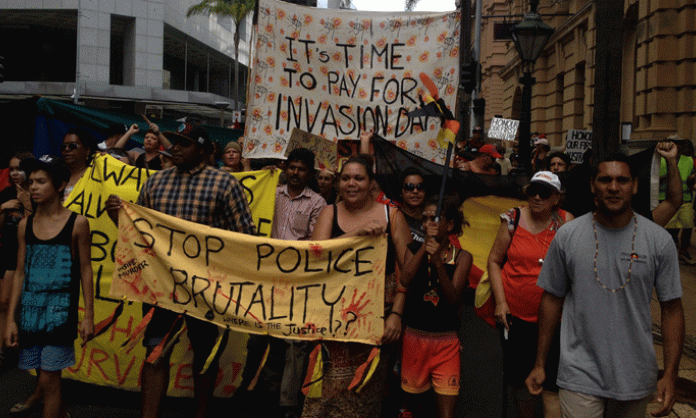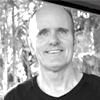On 26 January, Brisbane saw its biggest Invasion Day rally for many years. More than 400, predominantly Indigenous people, came together outside Parliament House to register disgust at the celebration of racism that is Australia Day and to send the message that, no matter the oppression, Indigenous people have survived and will continue to resist genocide.
The rally, chaired by Boe Spearim from the Sovereign Embassy, heard powerful and angry speeches from Indigenous men and women, some veterans of the 1970s street marches, some just coming into the struggle.
The crowd heard from longstanding activists Wayne “Coco” Wharton, Sam Watson and Ricky Pascoe. Also speaking was Ruby Wharton, a young school student who made news two years ago when she burned the Australian flag outside Parliament House. Paul Spearim, Gwenda Stanley and Aunty Karen from the Sovereign Embassy spoke. As did Callum Clayton-Dixon, editor of the Brisbane Blacks magazine, Les Malezer co-chair of the National Congress of Australia’s First Peoples, prison chaplain Reverend Alex Gator and Duncan Hart from the Refugee Action Collective and a member of Socialist Alternative.
Speakers slammed the proposal for Constitutional recognition and argued that true equality, sovereignty, would only come with a Treaty between the Australian government and all of the Aboriginal nations.
The Brisbane Invasion Day march is consistently the biggest in the country. Gwenda said that the day was “a coming together and uniting the Aboriginal nations”. People came from as far afield as Sydney, Rockhampton, Moree and Cunnamulla.
After the march Red Flag talked to some of the speakers.
Gwenda Stanley said that Australia Day is “a day of mourning but also a day of celebration. It’s about us all coming together and teaching everyone, it’s our opportunity to make people aware of the issues that Aboriginal people still face and that what happened 200 years ago is still happening today”.
Gwenda, who grew up in an activist family in Top Camp, Moree, explained how resistance continues in the regional communities: “Coming from Moree, it’s your bread and butter, your breakfast, lunch and dinner!”.
Sam Watson described how conditions are continuing to fuel anger. He talked about a nephew in Central Queensland whose family had been quite apolitical but had now become very active because mining companies were developing coal seam gas on their land “threatening sacred sites and song lines”.
Another nephew was concerned about police harassment in the working class suburb of Logan, while an uncle was angry about “the police and courts in Ipswich”. Invasion Day is a “safe place to come together to share their concerns”.
This year the crowd was younger than usual. Joining the groups of families with small children and elders this year were what Sam called “a huge number of people aged 15 to 25 or 30”, a sign that the baton of resistance will be handed to the next generation.
“I feel very good to be here today and be a part of this. This is about us all uniting and talking and standing up for our rights. It’s about inspiring the next generation to get up and continue and let the world know that we’re still here and still suffering”, said Gwenda.
Boe Spearim said that: “The times of passivity are over, the times of us sitting back doing nothing are over. We need to be out on the streets and we need to be articulating land rights and sovereignty just like our old people did in the 60s, 70s and 80s. There was a period when it did die off. But the fire has always been burning and you can see today that the fire is raging and getting stronger and stronger”.
Sam warned of the threats from conservative governments but also the potential for a fight back: “The stakes are getting higher and higher every year over the last 10 or 15 years and we’ve now seen the Newman and Abbott governments threatening to attack Aboriginal funding. Our mob won’t take this lying down. Listening to the passion and the anger and the voices on the march today, our mob are ready to do serious political business”.
This is a struggle that can bring together everyone under attack by the Abbott government. Sam finished: “The Black struggle has always relied very heavily on our non-Indigenous comrades and it’s been very educational for our mob to hear from that young white fella about the refugee situation. That’s important so we prepare the way to form connections across the racial divide, you might say. At the end of the day, we’re all fighting the one struggle.”









